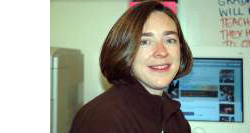
Drawing on her work in neurobiology, Tanner will discuss cross-disciplinary tools and insights and strategies for engaging students from all social, ethnic and cultural backgrounds.
Tanner is director of SFSU’s Science Education Partnership and Assessment Laboratory (SEPAL). It was founded in 2004 to integrate science education efforts into the university’s Department of Biology and College of Science and Engineering. SEPAL has an active research laboratory investigating how science is learned.
Following Tanner’s presentation, breakout sessions in the BSSB will start at 3:30.
They will address such topics as classroom stereotypes, fostering student research, using online library tools to engage students and dealing with offensive behavior in the workplace.
A complete list and schedule of the workshops is posted at http://www.humboldt.edu/institute. Online registration is available at the same address; deadline for sign-up is Aug. 14.
A happy hour/social mixer, including an iPad raffle, will conclude the half-day professional development session for administrators, faculty and staff.
HSU’s Institute for Student Success is a clearinghouse of practical teaching tips, based on advances in cognitive science that reveal how learning actually takes place.
Tips include providing stereotyped students with positive narratives with which to interpret their experience; drawing on anecdotes and examples from students’ everyday lives to connect classroom content with their own knowledge; breaking complex tasks down into component parts; monitoring students’ recurrent problems and watching for patterns in their mistakes; and providing feedback on specific areas in which students are making progress.